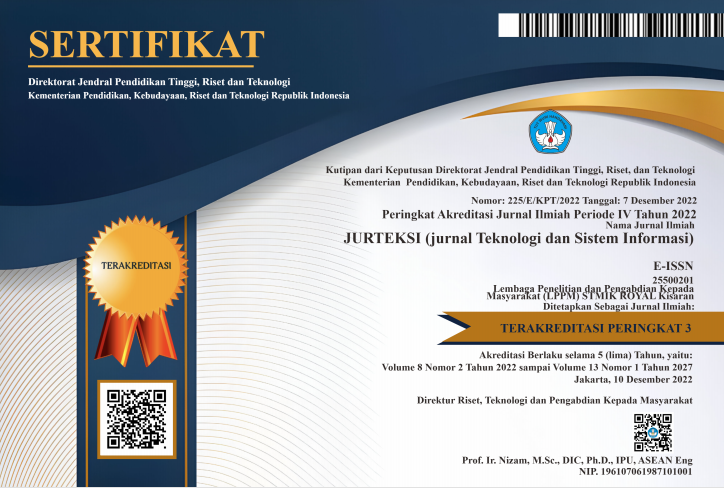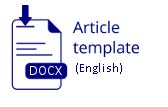ANALYSIS OF THE QUALITY OF "ONLINE EQUIVALENT" E-LEARNING USING WEBQUAL 4.0 AND IPA METHODS
Abstract
Abstract: The use of e-learning in non-formal education is increasingly important to support the improvement of access to learning, one of which is through the online platform. This study aims to analyze the quality of online services using WebQual 4.0 and Im-portance Performance Analysis (IPA) methods to evaluate the suitability between user expectations and perceptions. The research method used a quantitative approach by distributing questionnaires to active users, then analyzed using the WebQual Index to measure the overall quality of the system as well as the IPA to determine improvement priorities. The results showed that the quality of SeTARA Online was relatively good with a WebQual Index value of 0.798. However, there is still a gap between user expectations and satisfaction with a negative gap value of -0.238. The IPA analysis identified indicators in Quadrant I as priority improvements, especially in the aspects of service interaction and information presentation. These findings underscore the need for continuous development of features and technical support to optimize the user experience. The conclusion of this study suggests that there should be improvements in priority indicators to increase user satisfaction, as well as strengthen the effectiveness of online learning. Advanced research can expand variables, compare with other platforms, and combine quantitative and qualitative analysis methods for more comprehensive results.
Keywords: e-learning; importance performance analysis; quality of service; online equivalent; webqual 4.0
References
D. Al-Fraihat, M. Joy, R. Masa’deh, and J. Sinclair, “Evaluating E-learning systems success: An empirical study,” Comput. Human Behav., vol. 102, no. March 2019, pp. 67–86, 2020, doi: 10.1016/j.chb.2019.08.004.
R. Devianti and S. L. Sari, “Urgensi Analisis Kebutuhan Peserta Didik Terhadap Proses Pembelajaran,” J. Al-Aulia, vol. 6, no. 1, pp. 21–36, 2020.
A. S. AJIATMOJO, “Penggunaan E-Learning Pada Proses Pembelajaran Daring,” Teach. J. Inov. Kegur. dan Ilmu Pendidik., vol. 1, no. 3, pp. 229–235, 2021, doi: 10.51878/teaching.v1i3.525.
R. R. Eliandy, R. Adila, E. A. Hasibuan, and R. Ababiel, “Karakteristik, Jenis Dan Satuan Pendidikan Luar Sekolah,” Ittihad, vol. 5, no. 1, pp. 5–11, 2021.
N. Makdis, J. Jendri, and L. Ismail, “Model integratif kepuasan pengguna : pendekatan psikologis dan sosial dalam optimalisasi layanan perpustakaan,” vol. 5, no. 2, pp. 102–113, 2024.
D. A. Liani, M. Fikry, and M. J. Hutajulu, “Analisa Metode Webqual 4.0 dan Importance-Performance Analysis (IPA) Pada Kualitas Situs Detik.com,” J. Ilm. Merpati (Menara Penelit. Akad. Teknol. Informasi), vol. 8, no. 1, p. 34, 2020, doi: 10.24843/jim.2020.v08.i01.p04.
M. A. Athallah and K. Kraugusteeliana, “Analisis Kualitas Website Telkomsel Menggunakan Metode Webqual 4.0 dan Importance Performance Analysis Telkomsel Website Quality Analysis Using Webqual 4.0 and Importance Performance Analysis Method,” Cogito Smart J. |, vol. 8, no. 1, Jun. 2022.
A. A. Tanjung and M. A. Rasyid, “Pengaruh Disiplin Kerja Dan Kepuasan Kerja Terhadap Kinerja Karyawan Efarina Tv,” J. Manaj. Ekon. dan Bisnis, vol. 2, no. 1, pp. 49–59, 2023, doi: 10.61715/jmeb.v2i1.78.
C. B. Winardi, T. Pramiyati, and R. M. B. Wadu, “Analisis Penilaian Pengguna terhadap Kualitas Layanan Website Yayasan Beasiswa Jakarta Menggunakan Metode Webqual 4.0,” Senamika, vol. 0, no. April, pp. 260–273, 2021, [Online]. Available: https://conference.upnvj.ac.id/index.php/senamika/article/view/1333
P. Muslim Rasmanna, Y. Utami, and S. Pelita Nusantara Medan, “Uji Validitas dan Uji Reliabilitas Instrument Penilaian Kinerja Dosen,” J. Sains dan Teknol., vol. 4, no. 2, pp. 21–24, 2023.
M. M. Sanaky, L. M. Saleh, and H. D. Titaley, “ANALISIS FAKTOR-Faktor Penyebab Keter Lambatan Pada Proyek Pembangunan Gedung Asrama Man 1 TulehU MALUKU TENGAH,” Jul. 2021.
L. Irman Suhaedading, A. Fakultas Ekonomika dan Bisnis, and U. Gadjah Mada, “Pembatasan Sosial Berskala Besar (PSSB) saat Pandemi Covid-19 dan Dampaknya bagi Pasar Modal Indonesia,” 2020.
I. Mutmainah, I. A. Yulia, F. Marnilin, and A. Z. Mahfudi, “GAP Analysis Untuk Mengetahui Kinerja Implementasi Program Merdeka Belajar Kampus Merdeka,” J. Ilm. Manaj. Kesatuan, vol. 10, no. 1, pp. 19–34, Mar. 2022, doi: 10.37641/jimkes.v10i1.934.
A. Roeke and S. Nurlela, “Analisis Kualitas Aplikasi Shopee Menggunakan Metode Importance Performance Analysis (IPA),” 2023.
B. J. Forester, A. Idris, A. Khater, M. W. Afgani, and M. Isnaini, “Penelitian Kuantitatif: Uji Reliabilitas,” 2024.













